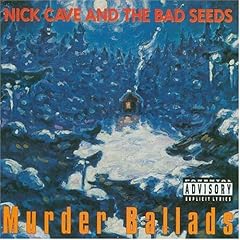
Non si parla di Tiziano Sclavi in questo post, e nemmeno di indagatori dell'incubo a fumetti. Invece, oggi voglio parlare di un disco - uscito ormai più di dieci anni fa - al quale sono molto legato. In qualche modo, potrei dire che questo post è il prequel di un post scritto mesi addietro su questo stesso blog; sì, perché l'album in questione è Murder Ballads, di Nick Cave. Di cosa sia una murder ballad e delle sue origini ho discusso già in quell'occasione, quindi approfitto di questo post per spendere qualche parola sul disco in questione. Un disco a mio parere perfetto sia nella scelta dei musicisti e degli ospiti, che negli arrangiamenti, ma soprattutto un disco dove il registro baritonale di Cave si modula per dare corpo ad una narrazione polifonica che assume i più svariati tratti dal guignolesco, al beffardo, al drammatico. Ballate dove sogno ed incubo si alternano al ritmo delle strofe e spesso si confondono, proprio come le voci che le sottolineano duettando. Ironia pungente e dissacrante, come quella di chiamare la canzone d'apertura - storia di un uomo che uccide moglie e figli - Song of Joy, giocando sul doppio senso del nome. Ci sono dialoghi degni del miglior Tarantino, e Stagger Lee ne è un valido esempio:
Just then in came a broad called Nellie Brown
Was known to make more money than any bitch in town
She struts across the bar, hitching up her skirt
Over to Stagger Lee, she starts to flirt
With Stagger Lee
She saw the barkeep, said, "O God, he can't be dead!"
Stag said, "Well, just count the holes in the motherfucker's head"
She said, "You ain't look like you scored in quite a time.
Why not come to my pad? It won't cost you a dime"
Ed è forse il gioco dei registri narrativi una delle caratteristiche più importanti del disco, registro colto, quasi da Child ballad e registro gergale, intermezzi corali e narrazione individuale (l'uso iterato dell'io narrante è uno degli stilemi più utilizzati nelle murder ballads), folk irlandese, rock tradizionale macchiato di elementi industriali, altre voci ed altri registri (PJ Harvey, Kylie Minogue, Shane McGowan). E' difficile scegliere un esempio da riportare in calce, ma volendolo fare, affido la chiusura di questo post alle parole del bel duetto con Kylie Minugue, Where the wild roses grow.
Where The Wild Roses Grow (Nick Cave feat. Kylie Minogue)
They call me The Wild Rose
But my name was Elisa Day
Why they call me it I do not know
For my name was Elisa Day
From the first day I saw her I knew she was the one
She stared in my eyes and smiled
For her lips were the colour of the roses
That grew down the river, all bloody and wild
When he knocked on my door and entered the room
My trembling subsided in his sure embrace
He would be my first man, and with a careful hand
He wiped at the tears that ran down my face
They call me The Wild Rose
But my name was Elisa Day
Why they call me it I do not know
For my name was Elisa Day
On the second day I brought her a flower
She was more beautiful than any woman I'd seen
I said, "Do you know where the wild roses grow
So sweet and scarlet and free?"
On the second day he came with a single red rose
Said: "Will you give me your loss and your sorrow"
I nodded my head, as I lay on the bed
He said, "If I show you the roses, will you follow?"
They call me The Wild Rose
But my name was Elisa Day
Why they call me it I do not know
For my name was Elisa Day
On the third day he took me to the river
He showed me the roses and we kissed
And the last thing I heard was a muttered word
As he knelt (stood smiling) above me with a rock in his fist
On the last day I took her where the wild roses grow
And she lay on the bank, the wind light as a thief
And I kissed her goodbye, said, "All beauty must die"
And lent down and planted a rose between her teeth
They call me The Wild Rose
But my name was Elisa Day
Why they call me it I do not know
For my name was Elisa Day








2 commenti:
La ringrazio per intiresnuyu iformatsiyu
La ringrazio per Blog intiresny
Posta un commento